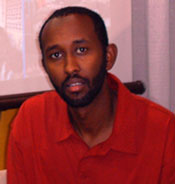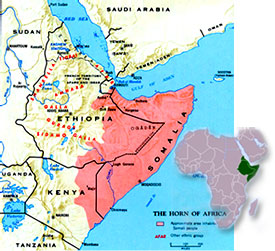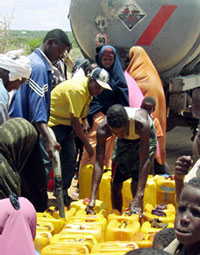FCNNEWSSOURCE

Activist says look beyond the headlines to the needs of the people

The Horn of Africa is primarily comprised of Somalia, Sudan, Ethiopia, Eritrea, Djibouti, Kenya, Tanzania, and Uganda. During this century, this region became the land of famine, war, and disease. The Horn of Africa is considered to be one of the poorest regions in the world and because of natural disasters such as drought, and the ravages of war, the already deplorable conditions have worsened.
The American Relief Agency for the Horn of Africa (ARAHA) is a U.S. based non-profit organization founded and managed by a group of concerned advocates and service providers originally from the Horn of Africa. ARAHA Board Member Jaylani Hussein, spoke to the Final Call Staff Writer Ashahed M. Muhammad about the mission of the organization and the current state of affairs in the region.
Final Call (FC): There is a humanitarian crisis in the Horn of Africa. Tell us a little about the region.
Jaylani Hussein (JH): The region tends to be one of the worst regions in the world, because of a lack of infrastructure, political unrest and if something happens, they have no support. A large percentage of the population is malnourished. They don’t have enough food and they don’t have a stable government.

This region is different than other regions because for example, if a crisis happens in let’s say South East Asia, at least you can have trucks move the food. In many places in the Horn of Africa, you don’t have that because there are no roads. It’s very difficult to assist people who are in need. Also, we have had droughts for the last five or six years. When rain even does come, like when we had rain about six or seven months ago, it flooded because the earth was not used to it. The area is a very difficult area to work with. Everyone remembers the great crisis in the 1990’s with Ethiopia and trying to help and feed them. Nothing changed. Those people are still in need. Ethiopia is one of the largest countries in that region and it suffers the most. Recently, the issue of the conflict in Somalia has been rising in the media, but prior to that, it did not exist because it’s just a bunch of hungry people with no political interests.
FC: When it comes to any humanitarian crisis, and money is donated, people have questions as to whether the money and resources really go where they are supposed to go. Given the fact that there is a weak infrastructure in the region to begin with and many weak governments, how do you respond to people who want to make sure the resources get to the people who are in need?
JH: The majority of the people who work at this organization are people who are self motivated to help. We don’t have any personal gains other than to help the people that we came from. Imagine if any of those people who were left behind were given an opportunity to be here only on the condition that they would help those who they left behind. None of them would miss that opportunity and they would all jump to it. We are just trying to do our duty.
FC: And the corruption?
JH: As far as corruption, that is one of the biggest problems in Africa. You’re not going to escape it, it is there. We’re trying to fight it in the best way we can. We try to work with the organizations and we have procedures and guidelines of how exactly every penny is spent. We need to account for every single thing, but again, this region politically is not an easy place to work in.
FC: In such a conflict torn region, what about the women and orphans?

JH: I’m glad you asked about that. This is one of the most important keys. The orphans are used as war soldiers. If you can take care of the orphans, they will be the ones able to help their country. By the time they are mature and have finished their schooling, they will be productive citizens that can help their people, not just people lagging behind becoming part of the problem, they can be part of the solution. It is important to take care of them, and religiously, we have a responsibility. It is a responsibility for the village and the world to take care of them.
FC: Many young orphans are being raised to be child soldiers.
JH: What happens is that because the orphan has no home, they tend to go wherever they can find food and shelter. Of course, there are people with agendas other than helping them that will use them. Just like in Southeast Asia, there is the sex trade because people have no place to go. In Africa, it is about war and warlords taking them. In West Africa, we have the diamond mining, in East Africa, it’s about war.
FC: What else would you like for people to know about what is going on in the region?
JH: Get educated about what is going on right now and listen to the news of what is going on over there. Not just the political (aspects) because that is really the only thing that the news shows. This is a humanitarian crisis, it is not a crisis of religion. This is a basic need of food and water and stability. That’s all those people are asking for. We are living here in one of the largest empires in the world (America) and we have companies that are so rich that they don’t know what to do with their money and people don’t know what to do with their food. We can stop world hunger if we put an effort to do it. It starts small. If people can just get their company to promise to help this region, that would be a start.
FC: Thank you.
(For information about how you can donate to the American Relief Agency for the Horn of Africa, visit www.araha.org or call (612) 781-7646.)












